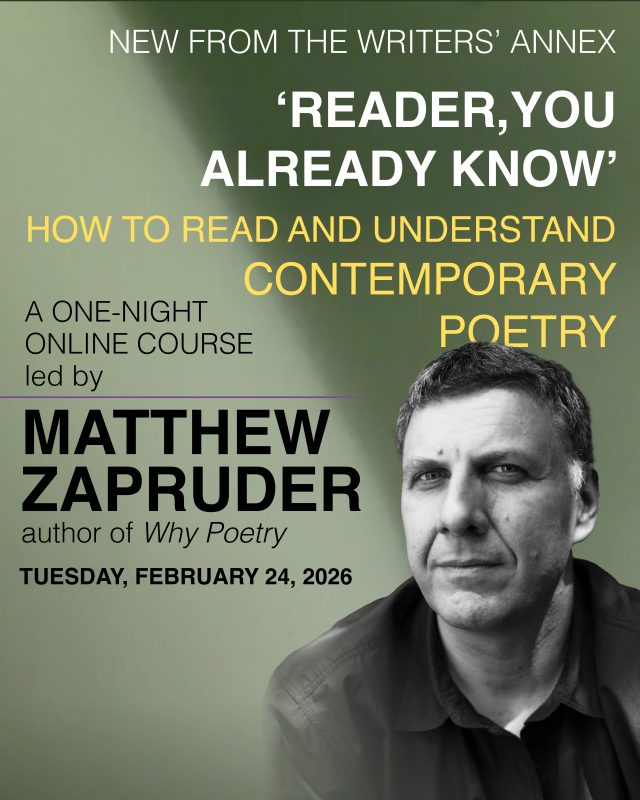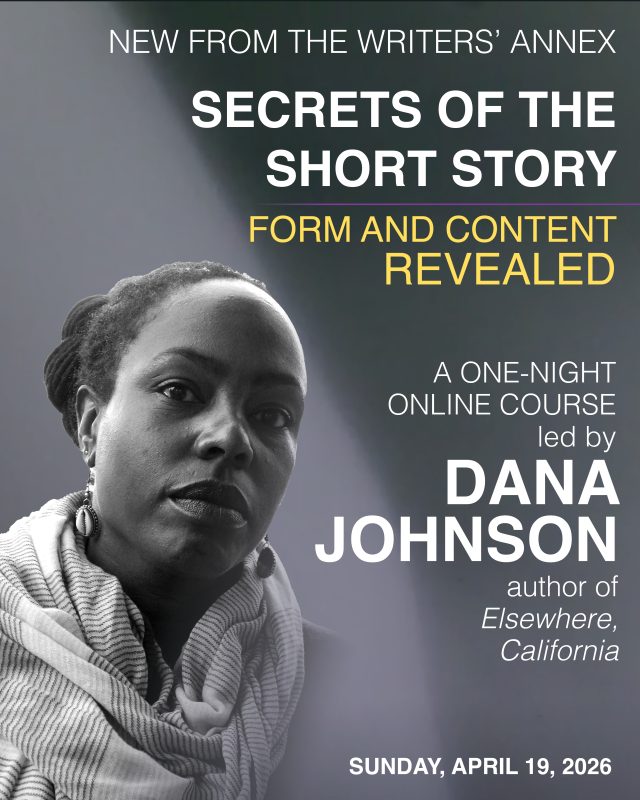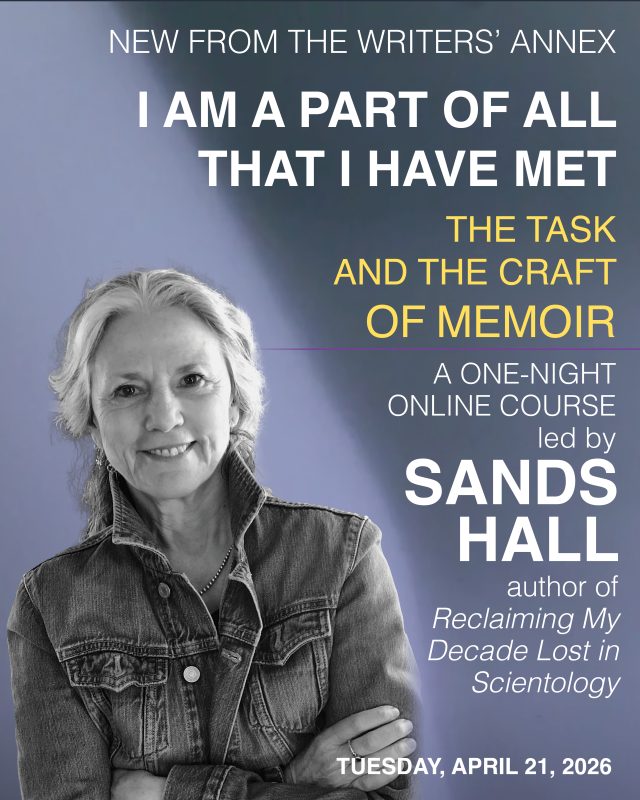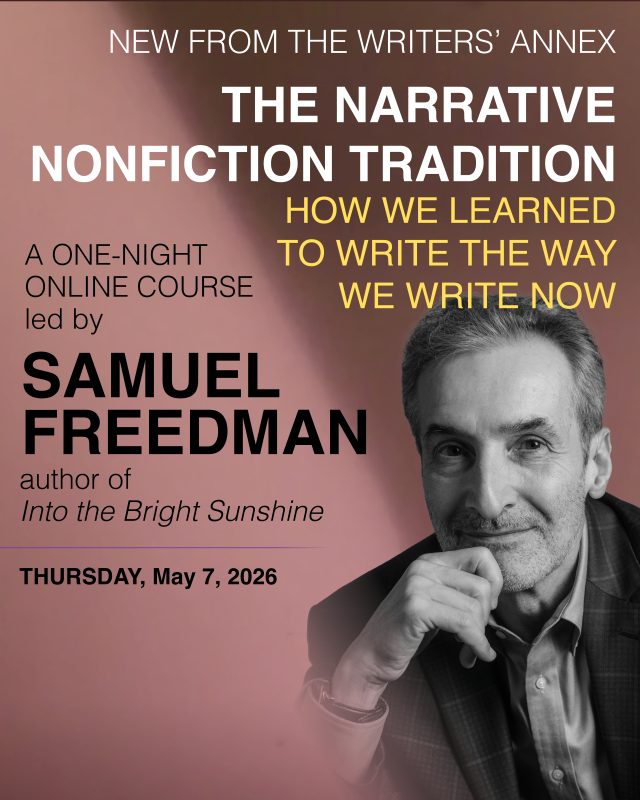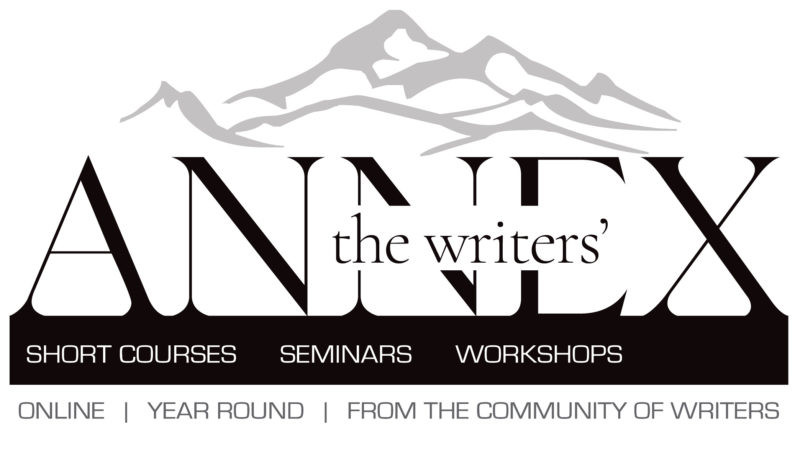
Online and year-round, The Writers’ Annex is composed of short literary courses, seminars, workshops, and more.
Our vision is to bring the creative insight and experience of our staff poets and prose writers to our community in all seasons, not just in the summertime, and not just here in our Valley. Our online literary courses will address such topics as eco-poetics, translation, and generative sessions. Some will be one or two days, some will be weekend intensives, and some will meet weekly for a month or two.
Our online literary courses are for writers, poets, readers and others who study the written word. We learned from our two years of offerings from the Virtual Valley that opportunities like this can be crucial for participants who aren’t in an academic setting, and who can’t make a week-long trip to the Sierra whether because of mobility, financial, employment, or familial constraints. We see The Writers’ Annex as a bridge for them.
2026 Season Pass & Spring One-Night Course Collection Pass
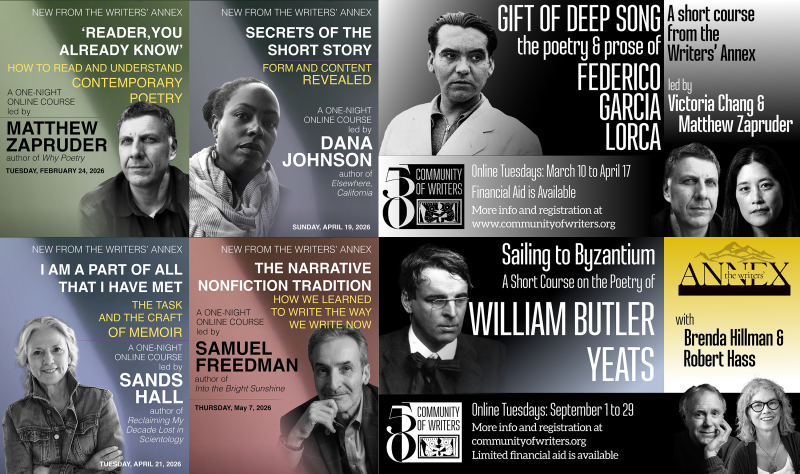
The Writers’ Annex is pleased to offer two deeply-discounted packages for those who would like to dive deeper into our 2026 course offerings. Our one-night courses are less pricey and require less commitment: no book purchase, etc. And for those who would like to participate in all of our 2026 programs, we have created a discounted season pass for all of our 2026 programming. This pass will also grant entry into any courses that may be announced in the Fall of 2026.
Learn about the 2026 Season Pass
Learn about the one-night courses pass: Spring Collection
You can register for individual courses below.
Upcoming Online Literary Courses
‘READER, YOU ALREADY KNOW’ – How to Read and Understand Contemporary Poetry
Tuesday, February 24, 2026
Led by Matthew Zapruder
In this class we will read four contemporary poems slowly, carefully, and closely. Each one will exemplify certain typical approaches by contemporary American poets. We will use these poems to talk about ways of entering into a poem that respect the words the poet has chosen, and the special nature of the poetic imagination, which is inherently metaphorical, intuitive, and leaping. We will be specific about what to do and when to do it, so that we can establish a plan for approaching any poem with respect and curiosity. We will talk about the different levels of reading — the literal, the allegorical, and the personal — and how each of those layers of reading is valid, but must be separated in order to respect the poem.
Learn More and Register
Gift of Deep Song – A Short Course on the Poetry of Federico Garcia Lorca
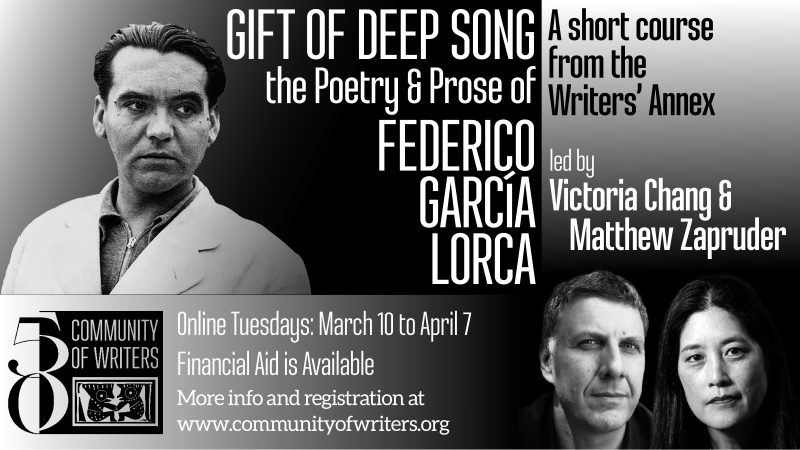
Tuesdays: March 10 to April 17, 2026
Led by Victoria Chang & Matthew Zapruder
In this short course we will combat indifference, by engaging energetically with Lorca’s poetry and prose. We will explore the mysteries of his poetry, and also how his ideas about poetry can help us read, write, imagine and understand. We will celebrate the life and poetry of a great artist, who, though murdered by fascists, lives on.
Learn More and Register
SECRETS OF THE SHORT STORY – Form and Content Revealed
Sunday, April 19, 2026
Led by Dana Johnson
How do short stories work? How do they provoke both questions and epiphanies despite not having the longer forms of the novel? In this two-hour course, we will read two to three short stories closely and carefully, exploring how they work and what they can reveal about the small, profound moments in our lives.
Dana Johnson is the acclaimed author of the novel, Elsewhere California and the short story collection In the Not Quite Dark, among other works. She is the Florence R. Scott Professor of English at the University of Southern California.
Learn More and Register
I AM A PART OF ALL THAT I HAVE MET: The Task and the Craft of Memoir
Tuesday, April 21, 2026
Led by Sands Hall
What differentiates a personal story that engages a few from one that garners a wide audience? Craft and structure certainly play their roles, but what are other qualities that make a reader flick the page, a listener to keep those earbuds in?
Perhaps one essential aspect is that the reader feels included. Even as they are drawn into a narrative larger than themselves, that narrative also feels personal—they become participants in the events being unfolded. Which brings us to craft. In this course we’ll take a look at this intersection: how the granular necessity of such things as point of view, building scene, “show” vs “tell” converges with the power of making a story not only about oneself, but about those who’ll read it.
Learn More and Register
THE NARRATIVE NONFICTION TRADITION – How We Learned to Write the Way We Write Now
Thursday, May 7, 2026
Led by Samuel Freedman
Whether in the form of memoir, history, or immersion reportage, the books of longform narrative that grip so many of us as readers, and try inspire so many of us as writers, come out of a tradition. It can be traced back millennia in some respects, all the way to Aristotle’s instructions about what he approvingly called a “complex plot.”
In this one-night, two-hour short course, we will trace these traditions and consider the threads that run through them, and explore aspects of the form that can benefit your own writing.
Learn More and Register
Sailing to Byzantium – A Short Course on the Poetry of William Butler Yeats
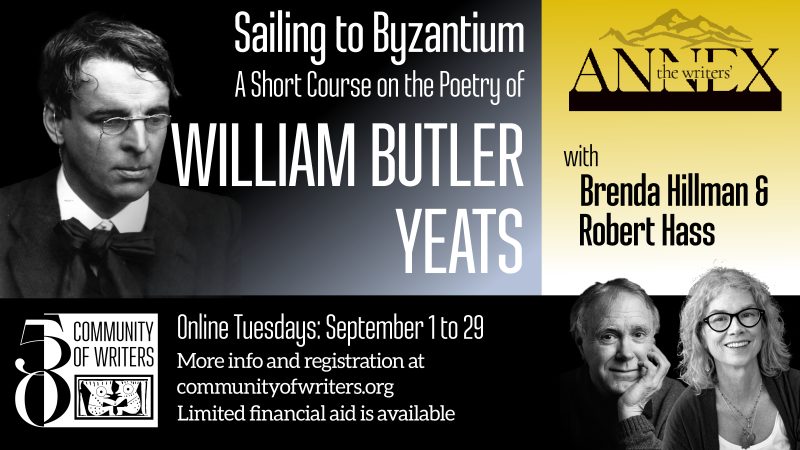
Tuesdays: September 1 to 29, 2026
Led by Brenda Hillman & Robert Hass
“O sages standing in God’s holy fire/As in the gold mosaic of a wall,/Come from the holy fire, perne in a gyre,/And be the singing masters of my soul.” William Butler Yeats is one of the master poets of the 20th century; we will be reading our way through the arc of a career that began in late 19th century Romantic and Symbolist methods, continued through the time of Ireland’s political struggle, forged a language that confronted the violence of the 20th century and transformed his early Romantic myths into a hard and enduring vision of the primacy of art. To get there, he made some of the most memorable poetic music of his time. We will track his work from his earliest interests in Celtic mythology through the later work of visionary force. The style of the course will be slow reading through a few poems per session, with background provided each week.
Learn More and Register
Past Online Literary Courses:
A Short Course on Moby Dick: Things of this World and the Next, led by Peter Orner. October & November 2025
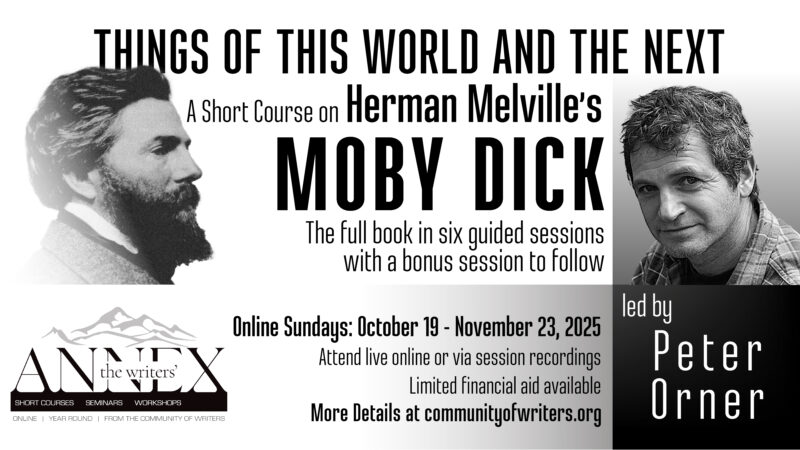
The Writers’ Annex is proud to present an upcoming course led by Peter Orner: Things of this World and the Next, a short Course on Herman Melville’s Moby Dick. Due to popular demand following Orner’s 2024 short course on James Joyce’s Ulysses, author and Dartmouth professor Peter Orner will return to the Writers’ Annex in the fall of 2025 to lead a new short course. All of Moby Dick in six guided sessions, with a bonus seventh session as well as discussion groups, additional essays and short stories, and many other opportunities. Over 14 hours of programming. An early bird discount is available through October 14, 2025. An additional discount is available to past Writers’ Annex participants.
I , Too, Sing America: Langston Hughes and his Contemporaries – A Short Course led by Major Jackson and Emily Bernard
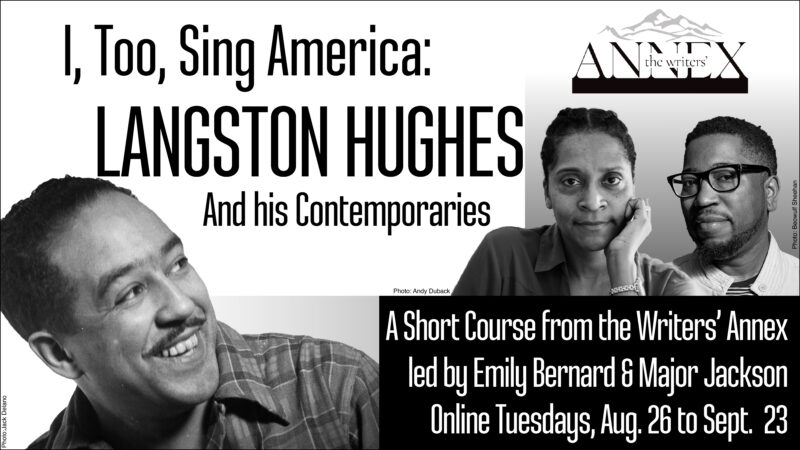
On the eve of the centenary publication of The Weary Blues, Langston Hughes’s debut volume of poetry, we are proud to present, “I, Too, Sing America.” We celebrate Langston Hughes’s life as an essential poet, playwright, memoirist, translator, and central figure of the Harlem Renaissance.
A writer who found inspiration in everyday people, their customs and music, Hughes’ evolution as a cultural and political writer inspired generations of writers on multiple continents. This short course will close read his most important and some obscure poems while addressing his significance as an American writer who, along with his contemporaries, first ushered in the possibilities of literature to address the dreams, aspirations, and political freedom of human beings around the globe. In addition, we will also discuss several prose works by Hughes that dramatize his perspectives on the complex dynamics between Black artists and their expanding readerships, consuming audiences, and structures of support in the twentieth century.
LATIN AMERICAN DEATH TRIP, led by Forrest Gander and Carmen Giménez
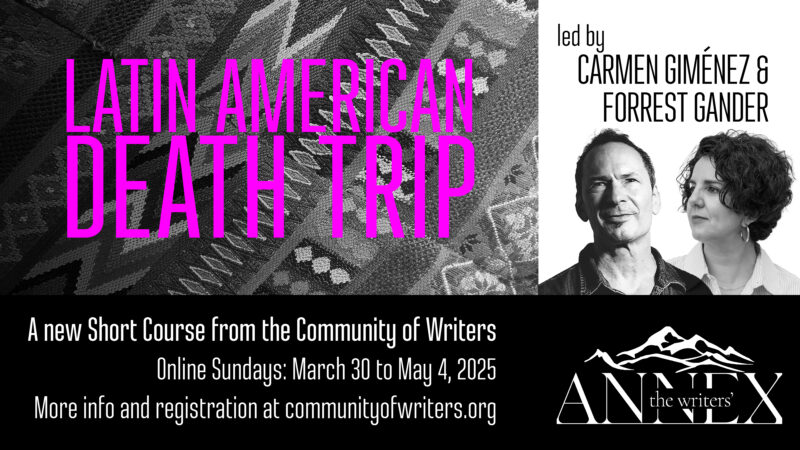
Death is the subject of many of the greatest (most moving, innovative, funny, haunting, political, oneiric) Latin American poems of the 20th century, from José Gorostiza’s Death without End to Gabriela Mistral’s “Death Sonnets,” from Xavier Villaurrutia’s Nostalgia for Death to María Rivera’s “The Dead.
What can we learn from that body of poetry that might be generative for our own thinking, feeling, writing? Many philosophers tell us that there is a signal connection between death and “the meaning of life.” What particularities of culture, gender, sexuality, age, faith or experience might account for the visionary clarity of death as constant companion or permeable border, etc. in Latin American poetry? Why are death poems so common in those cultures? Is it connected to traumatic resonances from the conquest? Does it go back to Maya, Aztec, or Incan cultural traditions? With what kinds of syntax, sound, image, structure, and vocabulary is death treated? How different are the cultural contexts from country to country? And why did we once think that only men seem to write them?
More of the Poetry and Poetics of Lucille Clifton
Once again in four parts, Kazim will lead participants through close readings of a number of Clifton poems, focusing on such topics as Clifton’s language, her engagement with history, mythology, and popular culture, her use of poetic form and prosody, and a tracing of various trajectories throughout her body of work, including the way she engaged with some of the most traumatic events of her life. Participants will receive a copy of Black Buffalo Woman: An Introduction to the Poetry and Poetics of Lucille Clifton, which will be used as the primary text for the course. The course will cover all new material, so those who took the first course are welcome to return and new students are especially encouraged.
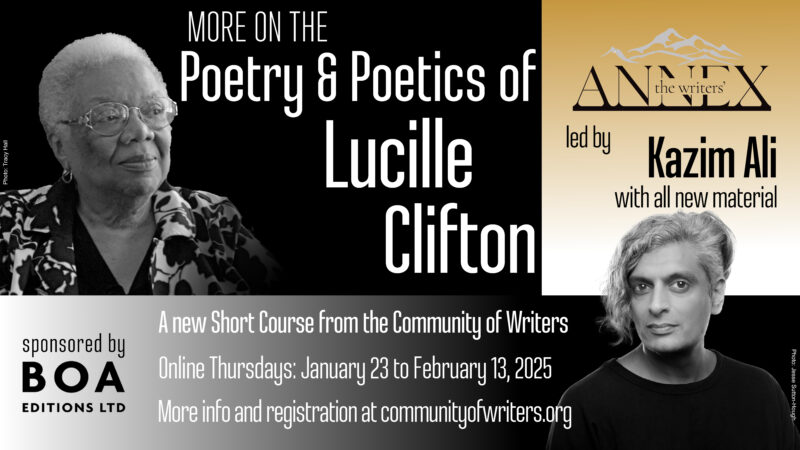
In 2022, Kazim Ali offered his original four-part course on the work of Lucille Clifton for the Community of Writers Writers Annex. Following the success of that course and the many requests he had for written versions of his lectures–which he had given off the cuff, drawing from nearly two decades of reading, teaching, reciting, and otherwise engaging with Clifton’s work–Kazim focused his energy on developing an expanding the four lectures into a book-length study of Clifton’s work. This second iteration of the class will draw from Kazim’s newly published volume Black Buffalo Woman: An Introduction to the Poetry and Poetics of Lucille Clifton, and will include a sneak peek at some of Clifton’s as-yet-unpublished poems which Kazim found in the Clifton Archives while doing research for his book.
Some of the Essential Emily: A Short course on the Poetry of Emily Dickinson, led by Brenda Hillman and Robert Hass
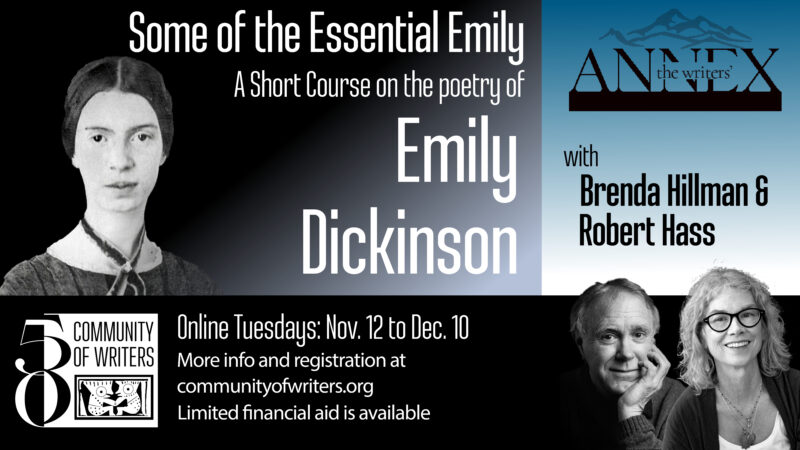
Emily Dickinson was born in 1830 and died in 1886. She began writing poems when she was a teenager and wrote something like 1500 poems over the course of her life, at least a hundred of which have been regarded as among the most striking poems in the English language.
Our aim in this class is to look closely at about twenty poems over the course of five weeks. We recommend first of all reading the poems intensely, and in preparation, if you are inclined, to immerse yourselves in her letters, her biography, and some of the influential critical responses to her work. We will be trying to read some of her most extraordinary poems.
Warm, Fullblooded Life: A Short Course on James Joyce’s Ulysses led by Peter Orner
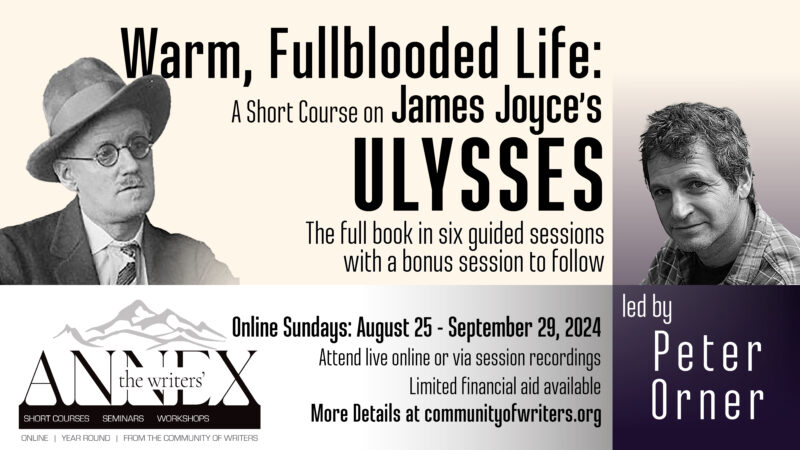
Our focus in this 7 week on-line masterclass will be on the book itself, not what others have said about it. We’ll read it slow and steady over six weeks and zero in on Joyce the storyteller, the creator of indelible scenes. And we’ll reserve a seventh session to get to anything we missed along the way.
Learn More
Rediscovering Sylvia Plath: A new short course on the Poetry of Sylvia Plath led by Victoria Chang and Matthew Zapruder
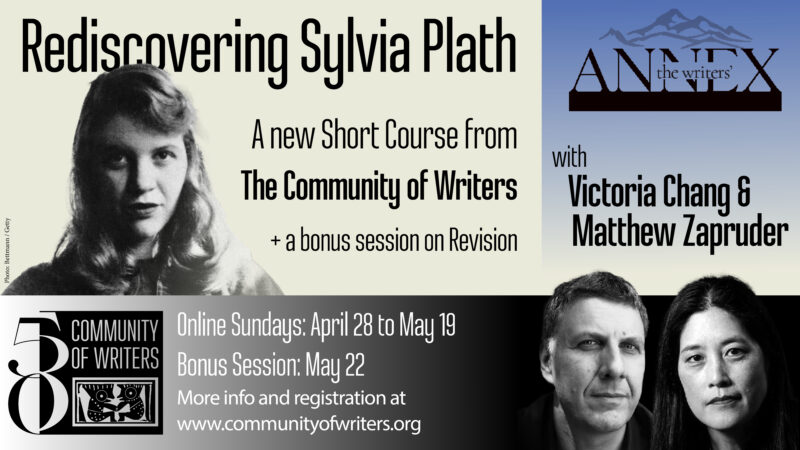
When we think of Sylvia Plath, it’s easy to see the image of the electric confessional poet who took her own life. Her tragic personal history, including her marriage to Ted Hughes, can easily obscure her poetry. But when we return to the work itself, we see a poet of genius, who mapped her struggles to find a completely original poetic voice.
Learn More
Words Are My Matter: a Short Course on the Craft of Ursula K. Le Guin
Online Thursdays, January 18 to February 8, 2024
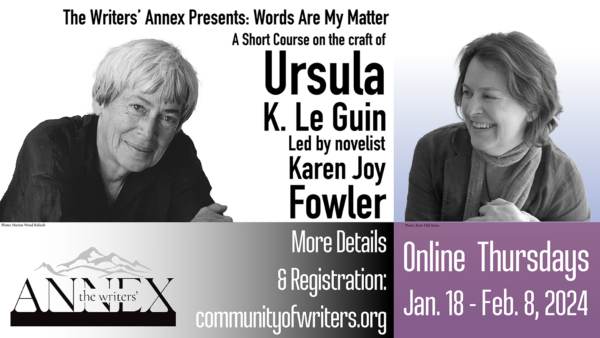
Join us for a Short Course on the Craft of Ursula K. Le Guin, led by author Karen Joy Fowler. Along with weekly guests, Fowler will work through the life and craft of the esteemed author, poet and essayist. Course includes 8+ hours of instruction time, a headquarters page with additional resources, optional discussion groups, assigned readings, and much more. Limited financial aid is available upon inquiry. Join us Thursdays, January 18 to February 8 as we explore the life and craft of Ursula K. Le Guin.
Learn More
That Poetry, By Which I Lived: A Short Literary Course on the Poetry of Galway Kinnell, led by Major Jackson
Online Tuesdays & Thursdays, November 30 to December 14, 2023
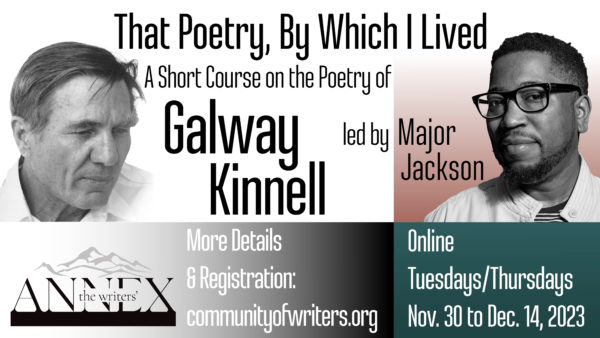
Galway Kinnell emerged as one of the most important poets of his generation simply for the distinct insistence on the primacy of our human natures, which served as an immense source for his ecological and spiritual imagination. Guided by a rapturous and ecstatic spirit attuned to the consciousness, pleasures, and injustices of his age, his poems exhibit inherent moral and social visions and invite readers to revel in that which binds us to each other and the natural world. We will study a selection of poems by this influential poet whose attitudes toward poetry and life shaped the ethos of the Community of Writers Poetry Program.
Learn More
A Short Course: CD Wright – An American Original
Online-Thursdays, August 31-September 28, 2023
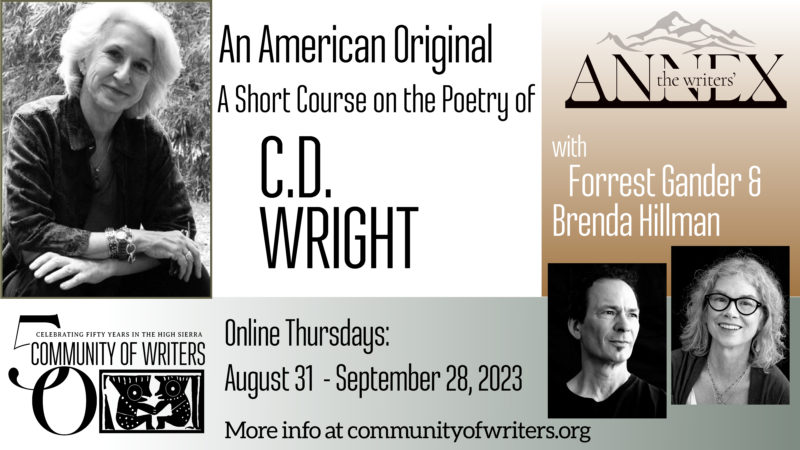
C.D. Wright’s poetry is some of the most beloved and legendary work of our literary era. She was a uniquely original writer but she was also part of— and helped to form— a vast unfolding literary community from the 1980s until her untimely death in 2016, traditions that included Elliptical, Documentary, Southern, Experimental, and Narrative Poetries; in addition, she was a master of the short lyric and the long poem. Aside from the visceral pleasures of reading her work, what do we have to learn from a writer with such a wide range of approaches to the poem? And how did she come to be the expansive writer we know? Poets Forrest Gander and Brenda Hillman will guide participants through an overview of Wright’s extraordinary writing. The online literary course will be designed for those who know Wright’s work already, as well as for those encountering her poetry for the first time.
This online course will take place on Vimeo.
Dates/Times: Thursdays: August 31-September 28 4:00-6:00 PM (Pacific) on Zoom
MORE DETAILS
Comet of Stillness: A Short Course on the poetry of W.S. Merwin
Online Sundays, January 22 to Febuary 19, 2023: 4-6PM PST
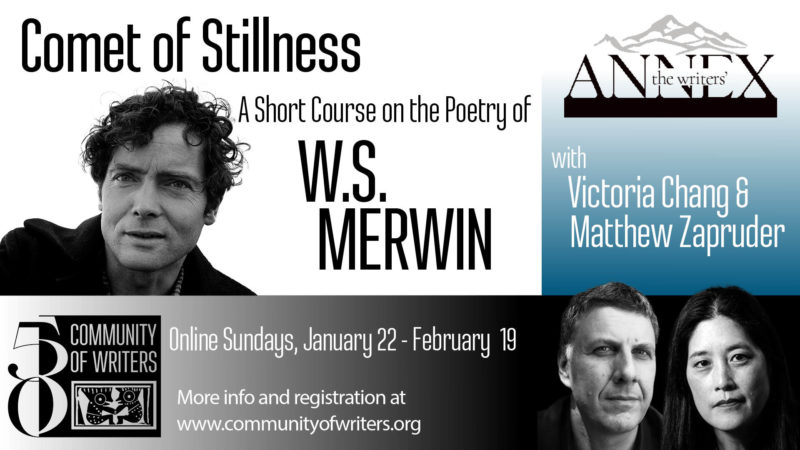
W.S. Merwin’s poetry was visionary, ecological, anti-war, and humanist, and exhibits a clarity and strangeness that continues to exert a profound influence on contemporary American poetry. The goal of these five sessions is to dive deeply into this extraordinary poet and his body of work. Across five sessions, poets Victoria Chang and Matthew Zapruder will facilitate close-readings of key poems, and will situate the poems, and the poet, in their historical contexts. The online literary course will explore Merwin’s formal innovations, his thematic concerns, and his development as a poet from his earliest work to his final poems. Chang and Zapruder will introduce, and talk with, key figures from his literary life, including Merwin’s long-time editor at Copper Canyon Press, Michael Wiegers.
In addition to online course meetings, Chang and Zapruder will provide additional reading materials. Each session will begin with an hour of discussion, including background and close readings, followed by a ten-minute break. The session will then reconvene for a second hour in which Chang and Zapruder will discuss thoughts from the chat, answer questions, and offer further insights. Each session will end with an optional poetry writing prompt based on Merwin’s poetry.
More Details
A Short Course in “The Waste Land”
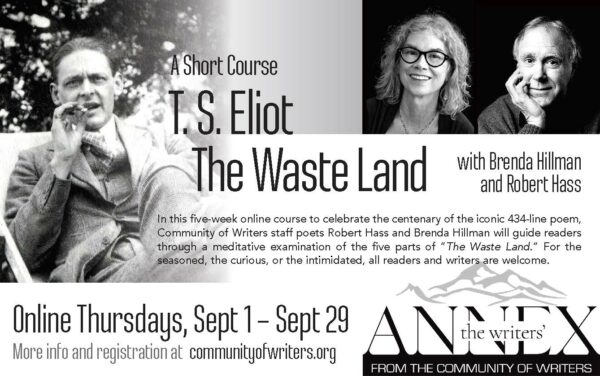
Online-Thursdays,September 1-29,2022
“The Waste Land” by T.S. Eliot, published in 1922, is widely regarded as one of the most influential, powerful— and at times one of the most controversial—modernist poems of the twentieth century. The poem’s collaged, fragmentary style, its frequent shifts among speakers, its use of literary allusions and its storied “difficulty” gave new meaning to literary engagement when the poem reached its first readers.
To celebrate the centenary of the iconic 434-line poem, Community of Writers staff poets Robert Hass and Brenda Hillman will guide readers through an examination and a meditative reading of the five parts of “The Waste Land” on five consecutive Thursdays of September, focusing on one part per session, tracing the poem’s memorable imagery and references in an investigation of its themes and legendary lines. In this time of climate change, pandemic and global despair, special attention will be paid to the way the poem is still relevant as it addresses urban environmental anxiety and the human condition, perhaps with an eye to finding how its techniques and phrases might deliver an odd comfort and energy for our time.
This online literary course will take place on Zoom or a similar platform.
Dates/Times: Thursdays in September, 2022 4:00-6:00 PM (Pacific) on Zoom
More Details
An Online Short Course: The Poetry & Poetics of Lucille Clifton
Online Thursdays, April 21-May 12, 2022
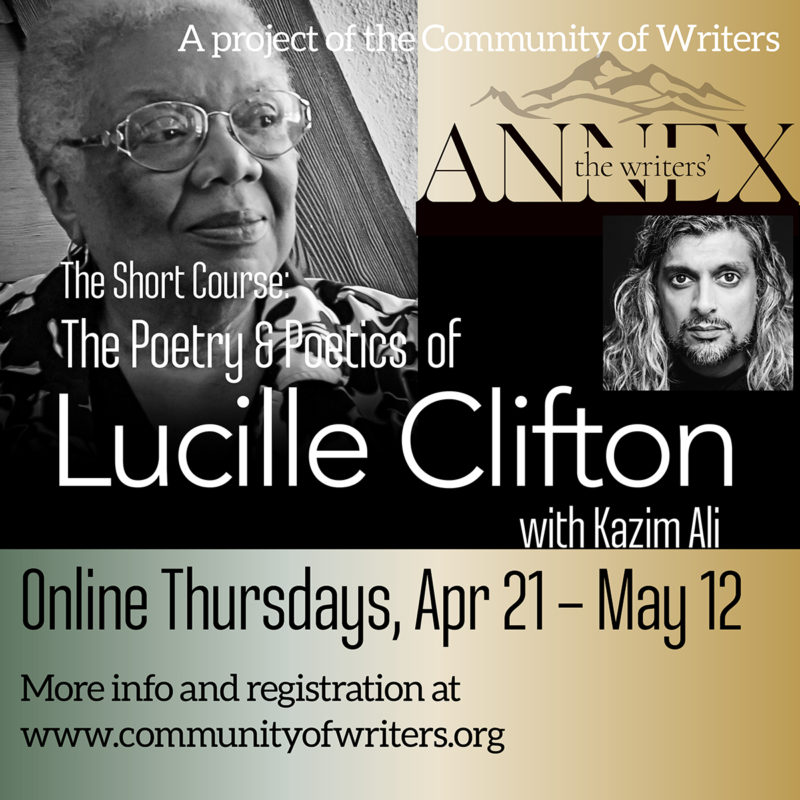
Lucille Clifton’s legacy as a poet, writer, and educator is far reaching and fundamental to the poetics of the 20th century and today. Championed by such giants as Robert Hayden, Toni Morrison, and Carolyn Kizer early in her career, Clifton became one of the major American poets of the last part of the 20th century.
This short online literary course on Clifton’s work will examine the major themes and qualities of her poetry. No background in poetry is necessary to learn and enjoy the majestic poetic work of Lucille Clifton.
Kazim Ali studied with her at the Community of Writers in the summer of 1998, and has published several critical essays on her work. He remained friends with her the rest of her life. She is one of two people on the planet who are allowed to call him “Kaz.”
This short, online literary course is for anyone who has an interest in reading or writing poetry. All are welcome.
An Online Literary Short Course: Reading Milosz
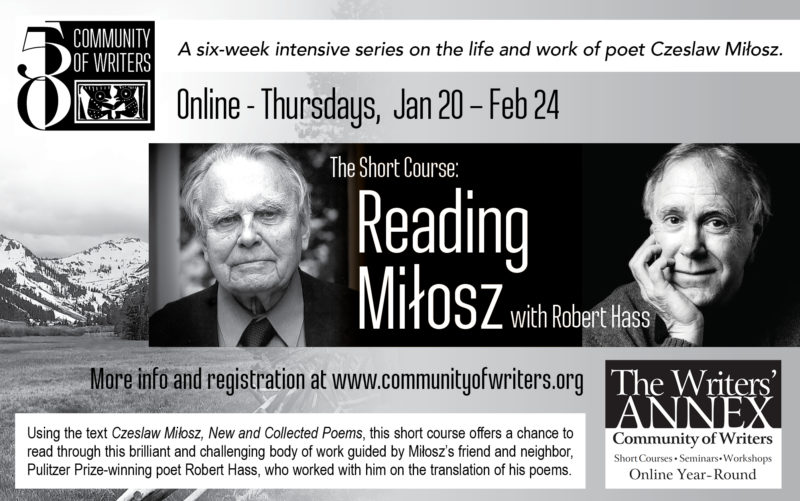
The Writers’ Annex is please to present our first short online course called “Reading Milosz” by Robert Hass. Czeslaw Milosz, Nobel Laureate, generally regarded as one of the great poets of the twentieth century, produced a large and various body of work. Milosz’s friend and neighbor, Pulitzer Prize-winning poet Robert Hass, worked with him for more than twenty-five years on the translation of his poems, many of which can be found in the anthology Czesław Miłosz, New and Collected Poems, a compilation that takes us across much of the intense life of the European twentieth century, in a poetry that uses ceaselessly inventive techniques and approaches to a range of subjects. The conversation promises to be rich and enlightening with Hass as our guide.

